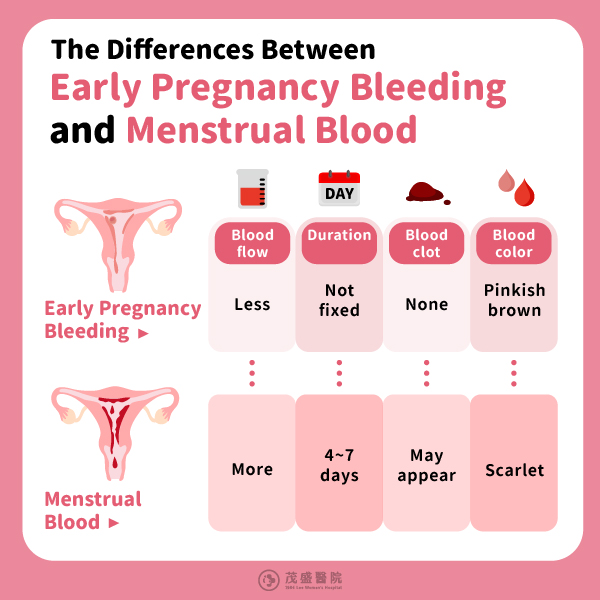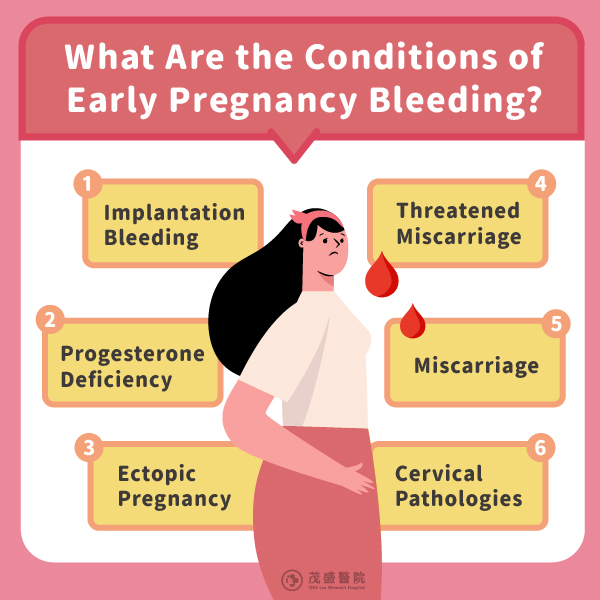Knowledge Sharing
Early Pregnancy Bleeding: 3 Tips to Tell Pregnancy Bleeding from Menstrual Blood During the Early Stages

Early pregnancy symptoms differ from person to person. While some expectant mothers don't feel much different, others suffer from severe morning sickness and frequent urination. The most worrisome symptom of all is "early pregnancy bleeding." Early pregnancy bleeding is actually a typical physiological occurrence; only abnormal bleeding has to be taken seriously.
Many people cannot tell the difference between "menstrual blood" and "early pregnancy bleeding." Whether you suspect you might be pregnant or have already confirmed your pregnancy, this article will help you understand the causes of bleeding and the precautions to take!
Early Pregnancy Bleeding: Find Out Right Away
- How to distinguish between menstrual blood and early pregnancy bleeding?
- Does early pregnancy bleeding that is bright red pose potential hazards?
- What conditions might cause early pregnancy bleeding?
- Additional inquiries regarding early pregnancy bleeding
- Doctors' advice on preventing early pregnancy bleeding
How to Distinguish Between Menstrual Blood and Early Pregnancy Bleeding?

- Blood Color:
Menstruation may start with brownish discharge, which then becomes a heavier flow of bright red blood. Early pregnancy bleeding typically has brown, dark brown, or pink blood. - Blood flow:
It can be challenging to differentiate between early pregnancy bleeding and the menstrual blood flow, which is often modest on the first day. On the other hand, the menstrual blood flow increased and remained heavy until the fourth or fifth day, at which point it began to drop. Early Pregnancy Bleeding typically results in spotting and very little blood loss. - Duration:
Menstrual Blood typically lasts about a week. The period of early pregnancy bleeding is variable.
| Early Pregnancy Bleeding | Menstrual Blood | |
| Blood Color | Brown, dark brown, or pink | Start with brown and turns bright red |
| Blood flow | Minimal, spotting | Increases after the second day |
| Duration | Not fixed | About a week |
Does early pregnancy bleeding that is bright red pose potential hazards?
Early pregnancy bleeding is a common symptom, and brownish discharge may occasionally accompany the embryo's implantation. However, bleeding is considered abnormal if it is a bright red color and comes with blood clots. This can be a sign of an ectopic pregnancy, miscarriage, or other disorders that could endanger the mother.
Analysis of Bleeding in Early Pregnancy
1.Blood Color
- Brown Blood:
Early pregnancy bleeding frequently results in a small amount of brown discharge that usually mixes with other secretions. - Bright Red Blood:
Seek medical help immediately if you experience bright red bleeding in the early stages of pregnancy that looks like menstrual blood or flows heavily. - Blood with Clots:
Bright red, menstrual-like early pregnancy bleeding that is accompanied by intense abdominal pain and unidentified blood clots may indicate a miscarriage.
2.Blood Flow
- Light Bleeding:
Spotting in early pregnancy is common. When wiping, you may notice a small amount or a few drops of blood on your underwear. This is usually not a reason for worry. - Heavy Bleeding:
It is abnormal and requires immediate medical attention if the amount of bleeding during the early stages of pregnancy is comparable to a menstrual period. - Bleeding with Clots:
Blood clots may be a symptom that the body has not yet completely evacuated a substantial volume of blood. This should be cautiously monitored as it may indicate an ectopic pregnancy or miscarriage.
3.Duration
- Bleeding for About 1-2 Days:
Short-term bleeding caused by instability in the early stages of pregnancy typically ends within 1-2 days. - Extended Bleeding for Over a Week:
In early pregnancy, persistent bleeding lasting more than one week requires immediate medical attention.
What conditions might cause early pregnancy bleeding?

- Implantation Bleeding: This is harmless and typically stops within 1-2 days.
- Progesterone Deficiency: An unstable endometrium and bleeding can result from low progesterone during the early stages of pregnancy.
- Ectopic Pregnancy: In many cases, lower abdominal pain and vaginal bleeding occur when an embryo implants outside of the uterus. Peritonitis and internal bleeding may occur in the course of an ectopic pregnancy rupture.
- Threatened Miscarriage: When persistent bleeding starts before 20 weeks of pregnancy, the cervix remains closed and the fetus’s heartbeat is audible, indicating a potential miscarriage.
- Miscarriage: Bleeding similar to a menstrual period, accompanied by abdominal pain. Part of the embryonic tissue may be expelled, forming clots, occurring before 20 weeks of pregnancy.
- Cervical Pathologies: Bleeding may result from diseases such as cervical cancer, uterine fibroids, polyps, or erosion.
What to Do If You Bleed During Pregnancy? Contact Lee's Women Hospital immediately.
- LINE Contact:Lee's Women Hospital's Online Customer Service
- Phone Contact: 04-22347057
Additional inquiries regarding early pregnancy bleeding
1.What Should I Do If I Notice Bleeding and Clots While Using the Bathroom During Early Pregnancy?
If you encounter blood clots during your early pregnancy, seek medical assistance immediately.
2.Does Early Pregnancy Bleeding Indicate a Miscarriage?
Early pregnancy bleeding may be caused by hormonal changes. If the bleeding is light and brown, and it stops within 1-2 days, there is usually no cause for concern. However, excessive and prolonged bleeding may indicate a miscarriage or an ectopic pregnancy. It is advised to see a doctor for an evaluation.
3.Should I See a Doctor if I Bleed After Sexual Activity in Early Pregnancy?
If you experience bleeding after sexual activity while pregnant, it is best to stop immediately. If the bleeding is minimal and there is no abdominal pain, you can relax at first. If the bleeding continues or becomes severe, get medical attention immediately.
4.Does Bright Red Bleeding with Clots in Early Pregnancy Indicate a Miscarriage?
Bright red blood with clots is abnormal but does not always indicate a miscarriage. To avoid negatively impacting your health, consult a doctor as soon as possible, follow the prescription from a doctor for bed rest and regular check-ups, and preserve emotional stability.
Tips from Doctors to Prevent Early Pregnancy Bleeding
In early pregnancy, the embryo's implantationis not yet stable, which can lead to spotting. During this period, it is advisable to rest and reduce physical activity.
Expectant moms who experience bleeding due to progesterone shortage are given supplemental progesterone to help stabilize their pregnancy. Progesterone can be taken orally, as suppositories, or as injections. This allows the embryo to implant more securely in the uterus, lowering the risk of a threatened miscarriage.
However, if the embryo is not healthy in the early stages of pregnancy, it might naturally be eliminated. If an early pregnancy miscarriage occurs, there is no reason to be overly depressed. It is critical to look after your health and get ready for your future pregnancy.
Regular prenatal exams are also essential during pregnancy. Early screenings can give expectant mothers peace of mind by confirming the growth and well-being of the fetus and identifying any anomalies.
◼︎Learn More About Dr. Ting-Feng Wu




